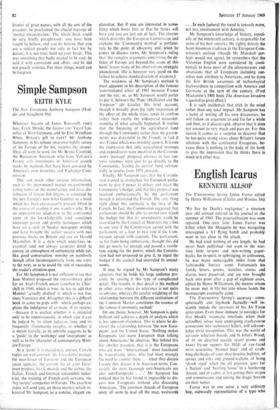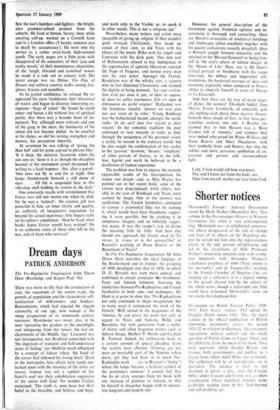English Icarus
KENNETH ALLSOP
'We live by Death's negligence,' a nineteen year old airman entered in his journal in the summer of 1943. The procrastination was soon repaired. One year later James Farrar was killed when the Mosquito he was navigating intercepted a VI flying bomb and probably went in too close to the attack.
He had tried nothing of any length; he had never been published—not even in the war- time little reviews and new-writing paper- backs, for in spirit, in upbringing, in artlessness, he was many unnavigable miles from that fashionable literary scene. Fortunately his family letters, poems, sketches, stories and diaries were preserved, and are now brought back into print after a gap of eighteen years, edited by Henry Williamson, the mentor whom he never met in life but into whose hands the manuscripts eventually came.
The Unreturning Spring's accuracy—atmo- spherically and log-book factually—will in- stantly impale the survivors of his Air Force generation. Even those immune to nostalgia for that bleakly traumatic interlude, when their schoolboy selves were undergoing crash-course conversion into technocrat killers, will acknow- ledge vivid recognition. This was the world of air-crew selection boards and St John's Wood; of PT on deserted seaside resort proms and NAAFI fry-up suppers for 104d; of raw-faced NCOS screaming 'Stannat heez' and of scrub- bing-the-backs-of-your-shoe-brushes bullshit; of sprogs and erks and ground-wallahs, of being 'shook rigid' when the oil pressure 'goes" for a Burton' and 'beetling home' in a lumbering Anson; and of cadets at last getting their stripes and commissions and sewing the magic brevets on their tunics.
Farrar was in one sense a very ordinary boy, outwardly representative of a type who
flew the RAF's bombers and fighters: the bright, alert grammar-school product from the suburbs. He lived at Sutton, Surrey; then, while awaiting call-up, worked on a Cornish farm and in a London office (I hereby sentence you to death by accountancy). He went into the service as a rather strait-laced, high-minded youth. The early pages are a little prim with disapproval of his associates, of their 'jazz and trashy novels,' of their monotonous obscenities, of the `tough, titivated and tarnished' wAAFs he made it a -rule not to consort with. His Secret escape was via Delius, The Flax of pream and solitary country walks among fox- gloves, bryony and woodbine.
As he gained confidence, he relaxed. He re- appraised his stern 'cookhouse sluts' disavowal of wAAFs and began to discover interesting ex- ceptions—'bags of talent.' He found he could swear and booze a bit without loss of spiritual purity, that there was a broader basis of en- joyment. Yet, although more tolerant and one of the gang in the mess, the luminosity of his Vision did not become dulled. As he excelled at his duties, so did his writing strengthen and mature, his perception intensify.
At seventeen he was talking of 'giving the Hun hell' and his prose aspired to phrases like: 'It is deep, the universe, lacustrine when the sun sees us.' Soon it is as though the discipline learned at his instrument panel sharpened his writing to a hard trueness—this, after a patrol: 'One does not fly to and fro at night. One hangs thunderously beneath a still dome of stars . All life is suspended here in this vibrating shell holding its station in the dark.'
One constantly recalls with astonishment that Farrar was still not twenty-one when he died, for he was a 'natural': the creative gift was powerful in him, an inner clarity and quality, an authority of imaginative expression -far beyond his actual experience. One lingers sadly on his editor's valediction : 'Had he lived, what books James Farrar would have written! 'He is an authentic voice of those who fell in the war, and of those who survived.'



































 Previous page
Previous page